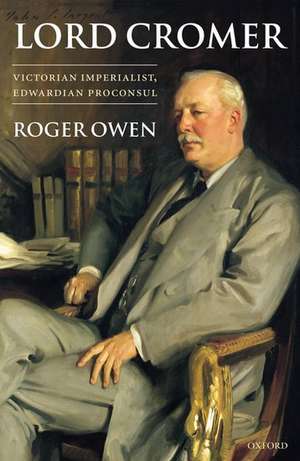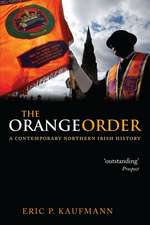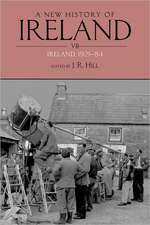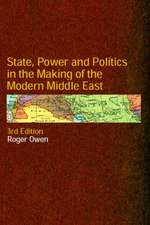Lord Cromer: Victorian Imperialist, Edwardian Proconsul
Autor Roger Owenen Limba Engleză Hardback – 28 ian 2004
Preț: 618.07 lei
Preț vechi: 1244.24 lei
-50% Nou
Puncte Express: 927
Preț estimativ în valută:
118.37€ • 121.96$ • 99.16£
118.37€ • 121.96$ • 99.16£
Carte tipărită la comandă
Livrare economică 13-19 februarie
Preluare comenzi: 021 569.72.76
Specificații
ISBN-13: 9780199253388
ISBN-10: 0199253382
Pagini: 460
Ilustrații: 12 pp plates, family tree, map of Cairo 1900
Dimensiuni: 169 x 240 x 27 mm
Greutate: 0.8 kg
Editura: OUP OXFORD
Colecția OUP Oxford
Locul publicării:Oxford, United Kingdom
ISBN-10: 0199253382
Pagini: 460
Ilustrații: 12 pp plates, family tree, map of Cairo 1900
Dimensiuni: 169 x 240 x 27 mm
Greutate: 0.8 kg
Editura: OUP OXFORD
Colecția OUP Oxford
Locul publicării:Oxford, United Kingdom
Recenzii
Judicious and timely biography ... Owen does not need to apologise for the Proconsul. He successfully explains him and his actions in his subject's own terms--much as David Gilmour did in his biography of Lord Curzon, and that is praise indeed.
Owen presents a man of liberal principles forced, like Tony Blair, to change his approach because of the demands of the job. He is good on the diplomatic connotations of Baring's policies and skilfully integrates the necessary economic detail into his text.
The story of the way that Cromer imposed his will by constantly outmanoeuvring French investors, Cairo journalists, British Radical politicians, Egyptian premiers, gung-ho generals and Turkish suzerains makes this a fascinating read.
Owen's fine and scholarly book shows how in fact there was a delightful personality behind the proconsul who always looked as though he was modelling for his own statue.
This masterly biography, the first modern life of one of the most famous of British imperialists. Roger Owen is the first person to make extensive use of Cromer's notes and the archives in the Foreign office and in the India Office concerning his years of power.
Owen presents a man of liberal principles forced, like Tony Blair, to change his approach because of the demands of the job. He is good on the diplomatic connotations of Baring's policies and skilfully integrates the necessary economic detail into his text.
The story of the way that Cromer imposed his will by constantly outmanoeuvring French investors, Cairo journalists, British Radical politicians, Egyptian premiers, gung-ho generals and Turkish suzerains makes this a fascinating read.
Owen's fine and scholarly book shows how in fact there was a delightful personality behind the proconsul who always looked as though he was modelling for his own statue.
This masterly biography, the first modern life of one of the most famous of British imperialists. Roger Owen is the first person to make extensive use of Cromer's notes and the archives in the Foreign office and in the India Office concerning his years of power.












